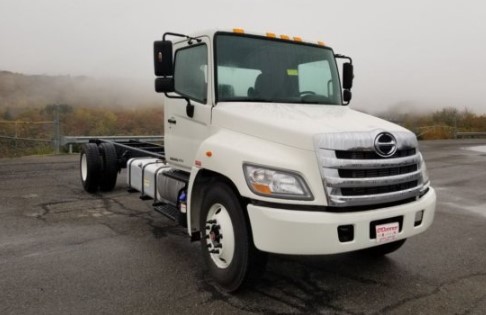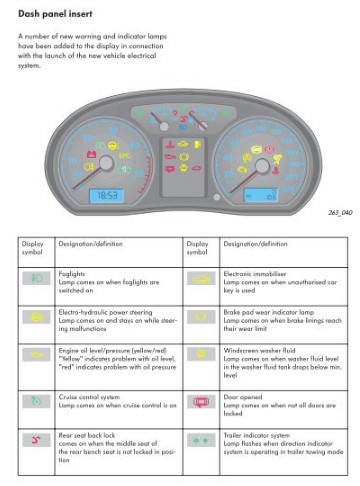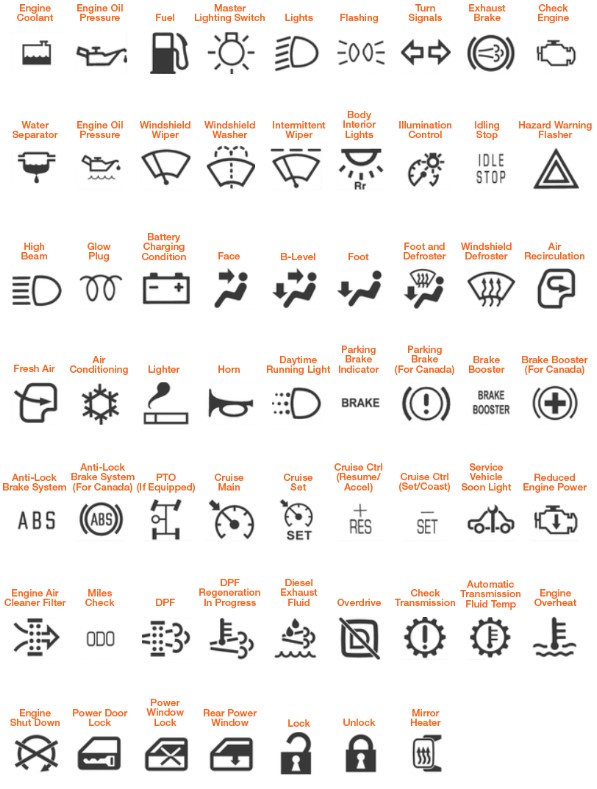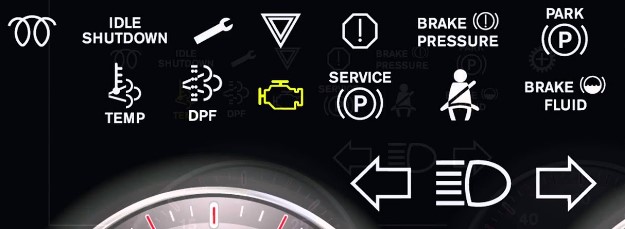Hino 268 Warning Light Symbols can be confusing, especially when first seeing them. So, in this article, we will discuss the meanings of all 4 warning light symbols and what they mean when you see them on your Hino. This information will help you better understand the messages these warning lights are trying to send you and take the appropriate action when necessary.
💥
What Kind Of Duty Truck is Hino 268?

The Hino 268 is a medium-duty truck that is perfect for various applications. It has a versatile body that can be customized to fit your specific needs, and its powerful engine ensures that it can handle even the toughest jobs. Whether you need a truck for commercial or personal use, the Hino 268 is an excellent choice.
What is a Hino 268 Warning Lights?

When your Hino 268’s warning lights are on, it means a problem with one of the vehicle’s systems. In most cases, this will be the airbag system. There are a few warning lights, each with a specific meaning. The Check Engine Light is the most common warning light on a Hino 268. When this light comes on, it means that there is a problem with the engine or some other component in the machine.
Read also:
Hino 268 has a variety of warning lights that indicate different things. Some of the most common ones are:
- Brake light: this shows that the brakes are not functioning properly and need to be fixed
- Oil light: this means that the engine is low on oil and needs to be refilled
- Battery light: this means that the battery is not charging properly and needs to be replaced
- Check engine light: this indicates something is wrong with the engine, and it needs to be checked by a mechanic.
Read also:
The Meaning of the Hino 268 Warning Light Symbols

The meaning of the Hino 268 warning light symbols is not fully understood, but it is generally accepted that they indicate some problem with the vehicle. Sometimes, the warning light may even show an imminent safety hazard.
The most common Hino 268 warning light symbols are associated with problems with the engine. These problems include a broken or defective fuel injector, a seized engine component, or a clogged air filter. Other common warnings include codes indicating low oil pressure, water in the oil, and a defective transmission fluid level sensor.
If you’re encountering one of these warning lights on your Hino car, it’s important to take action as soon as possible. You might want to call your dealer for assistance or try to fix the problem yourself if you don’t have access to a mechanic. The sooner you can address any issues with your vehicle, the safer you and everyone around you will be.
How to Fix a Hino 268 Warning Lights?
If you see warning light symbols on your Hino 268 dashboard, there is a good chance that one or more of your warning lights are malfunctioning. In this article, we’ll discuss the different warning light symbols, their possible causes, and how to fix them.
- Check the vehicle’s battery and charging system.
- Inspect the engine air filter and replace it if necessary.
- Verify that the engine oil level is correct and top off if needed.
- Inspect the coolant level and add coolant if necessary.
- Clean or replace the spark plugs as needed.
- Inspect the vehicle’s lights and bulbs, replacing any burned or damaged ones.
If you’re experiencing a warning light on your Hino 268, there may be some issues with the engine. In most cases, an error code associated with this light means the machine is not functioning as it should and might require professional repair. If this is the case, don’t try to fix it yourself – take your vehicle to a mechanic who can diagnose and correct the issue.
FAQs About Hino 268 Warning Light Symbols
What does this light on my dash mean?
Green and blue lights indicate a system is powered on or operating properly. Orange/yellow warning lights indicate that the vehicle may need to be serviced soon, although this is not as urgent as if a red light appears, which calls for immediate attention. Ignoring any warning sign could lead to potential damage or malfunctioning of one’s vehicle, and all warnings must be taken seriously so that costly repairs can be avoided.
What does the turtle light mean on a Hino truck?
The warning light of a hybrid vehicle will come on when the battery temperature is too high or too low or if the battery capacity has decreased while the selector lever is in “R” mode. Power will be limited if this occurs, and drivers should avoid hard acceleration. It is important to stay mindful of these conditions to ensure safe driving.
What does the orange light symbol mean?
Orange and yellow dashboard lights are important indicators that something needs to be serviced soon. For instance, orange or yellow dashboard lights may signify the need for an oil change or a problem with your vehicle’s emissions system. It is essential to pay attention to these warnings and take action as soon as possible to ensure your and other drivers’ safety on the road.
Is Hino 268 a good truck?
This truck offers impressive fuel economy, dependable performance, and excellent residual value, making it the perfect choice for pick-up and delivery, lease/rental, and moving operations. Its reliability is second to none in its class.
How many miles can a Hino last?
Owning a commercial truck means investing in reliable, long-lasting transportation. Hino trucks are known for their longevity and durability; with proper maintenance and care, owners can expect to reach up to one million miles of driving before needing major repairs or replacements. Investing in a Hino truck is an excellent choice for dependable commercial transportation solutions.
How reliable are Hino trucks?
Hino is renowned for its dependability when it comes to work trucks. By investing in Hino, businesses can save money on costly repairs and upkeep as the brand offers comprehensive warranties that ensure a reliable vehicle. Furthermore, Hino’s trusted reputation makes it an ideal choice for fleets looking to purchase new trucks.
How many miles per gallon does a Hino 268 get?
This truck has an average of 3.3 miles per gallon compared to other trucks, which have only 1.5 miles per gallon, making it highly fuel efficient. It is also low-maintenance and dependable, resulting in lower costs for repairs and maintenance. Furthermore, this truck is easy to drive, making it a great choice for daily use.

Re: 1989 Hino Rainbow Bus non-turbo, rear engine.
After installation of a new clutch system, when test driving it, on the dashboard row of lights there is a red light showing. It’s lower right hand side icon, rectangle in shape, looks like a small container and showing half full (in red). What is this icon please.
The rectangle icon that appears half full could represent the brake fluid reservoir, and if it’s illuminating, it usually means the fluid is low and needs to be refilled. However, this is a general interpretation and might vary based on the specific model and year of your vehicle.
For an accurate interpretation, please refer to the vehicle’s owner’s manual as it will have a detailed explanation of each warning light and its meaning.
Also, since this light came on after installing a new clutch system, it would be wise to consult with the mechanic who performed the work to ensure that everything was installed correctly and that there’s no leak or other issue causing this warning light to turn on.
Always remember, safety first. Don’t continue to drive the bus if there’s a potential issue with the brake system.
What does a pull sign mean on the lever in the Hino truck
The “pull sign” on a lever in a Hino truck typically refers to the parking brake or emergency brake. You usually have to pull this lever up or towards you to engage the parking brake. This brake is used when the truck is parked to prevent it from rolling away. However, if this symbol is illuminated while you’re driving, it could mean that the parking brake is still engaged. Make sure to disengage it before driving. If the light remains on even after disengaging, it may indicate a problem with the brake system, which should be checked by a professional.
What does the warning light on my 2008 Hino 268 mean
It looks like a backward L and then a frontwards L with a propellor in the middle and 4 vertical lines above the center
The warning light you’re describing for your 2008 Hino 268 sounds like the “Exhaust Brake Warning Light.” Here’s a breakdown of its components:
Backward L and Frontward L: This typically forms a square or rectangular shape, which is a common representation for brakes in many vehicles.
Propellor in the middle: This is likely the symbol for the exhaust or turbo, indicating that the warning is related to the exhaust system.
4 Vertical Lines: These lines often represent airflow or exhaust flow.
When this light illuminates, it’s indicating that the exhaust brake system is active. The exhaust brake is a feature in many diesel engines that helps slow the vehicle down by restricting the flow of exhaust gases, thereby creating back pressure in the engine. This is especially useful when descending steep grades or when additional engine braking is desired.
However, if this light is flashing or stays on when it shouldn’t, it might indicate a problem with the exhaust brake system. In such cases, it’s a good idea to consult your vehicle’s owner’s manual or contact a Hino service center for further guidance.